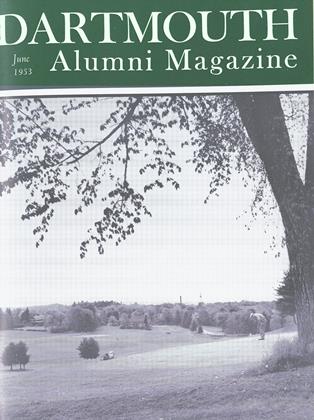WHEN I offered to buy space in the ALUMNI MAGAZINE in order to make a short statement on my new book Rebel Thought, the editor suggested that I write it in my column instead, and so without apology I here do so.
I wrote the book because for three years I have been irritated more than once by reading that professors in America no longer dare to speak out' because of the inquisitorial and un-American tactics of certain self-appointed arbiters of patriotism, loyalty, and thought. When the Beacon Press gave me a contract to write a book on rebel thinkers, I felt that this might be a good chance to accept this challenge. I still think so, and I have written as boldly and as unequivocally as I can a book about unorthodox and stimulating thought.
The first draft was written in 1951; it was revised in the summer of 1952, and it is as honest a reply as I have been able to make to these super but dubious patriots.
With this issue I believe that I complete the nineteenth year of writing HanoverBrowsing. I am grateful for the interest this has aroused among readers of this MAGAZINE, and I hope I may continue to write it for some time to come. I have a few good books to recommend.
Edmund W. Sinnott's Two Roads toTruth, published by Viking, is a thoughtful book about religion and science. This is an age-old question and Mr. Sinnott points out some basis for unity under the great tradition.
Though Hesketh Pearson's The ManWhistler (Harper, 1952) is no great shakes as a biography of a great, if eccentric, painter, nevertheless it is easy to read, is often amusing, and though sketchy, does give the reader an adequate impression of that strange, difficult American named James McNeill Whistler. He died fifty years ago.
I usually enjoy historical novels if they are well done. I did enjoy John Brick's The Rifleman (Doubleday), a novel based on Tim Murphy, one of Morgan's riflemen in the Revolutionary War. Residents of upper New York State should find it especially enlightening. Here are the actions against the Indians, the French and the English around Saratoga, Unadilla, Newtown, Cobus Kill, Schoharie, and so on.
Elizabeth Coatsworth is a writer with many followers, I among them. Her latest book, Silky, described as "an incredible tale," is about a Maine farmer in middle life, Cephas Hewes, bedeviled in more ways than one, who is rescued by the power of the supernatural. Maybe in the world of the H-bomb, the supernatural is necessary and if so, Miss Coatsworth handles it wonderfully well, as she demonstrated in her recent book, The Enchanted.Silky is well out of the realm of the commonplace in American fiction, and is highly recommended. Pantheon is the publisher.
Since Jose Clemente Orozco finished his Dartmouth murals in 1934 there has been much discussion, for and against, among the alumni concerning them. To bring more light and less heat to the controversy, I strongly recommend the reading of MacKinley Helm's rich and excellent book: Man of Fire: Orozco, published by Harcourt, Brace. The book has everything: intelligent and lucid criticism, fine illustrations, and a brilliant chapter especially interesting to Dartmouth men called "The White God at Dartmouth."
Orozco wrote: "Errors and exaggerations do not matter. What matters is boldness in thinking with a high-pitched voice; in speaking out about things as one feels them in the moment of speaking; in having the temerity to proclaim what one believes to be true without fear of the consequences. ... If one were to await the possession of the absolute truth, one must be either a fool or a mute. If the creative impulse were muted, the world would then be stayed on its march."
These are the words of a great man, and Dartmouth may well be proud to possess so powerful and moving a work of art, even if it is not entirely successful.
A new series of really good reprints, the Anchor Books, is now being issued by Doubleday. I have seen one of them, Conrad's The Secret Agent, and it is well printed, adequately bound in paper covers, and modestly priced at 75 cents. Other books in the series include titles by Edmund Wilson, Andre Gide, Mark van Doren, James B. Conant, and others.
The Mentor book by Robert M. Fisher called How to Know and Predict theWeather I also found most interesting. This is only 35 cents, and goes well on the shelf with The Wonderful World of Books.
For the summer: Happy Landings.
 View Full Issue
View Full Issue
More From This Issue
-
 Class Notes
Class Notes1918
June 1953 By ERNEST H. EARLEY, RICHARD A. HOLTON -
 Article
ArticleTHE YEAR IN REVIEW
June 1953 By RICHARD C. CAHN '53, UNDERGRADUATE EDITOR -
 Class Notes
Class Notes1915
June 1953 By PHILIP K. MURDOCH., MARVIN L. FREDERICK -
 Article
ArticlePulling Answers Out of the Air
June 1953 -
 Class Notes
Class Notes1929
June 1953 By F. WILLIAM ANDRES, GEORGE B. REDDING -
 Class Notes
Class Notes1932
June 1953 By JOHN A. WRIGHT, JAMES D. CORBETT
HERBERT F. WEST '22
-
 Article
ArticleHanover Browsing
May 1940 By HERBERT F. WEST '22 -
 Article
ArticleHanover Browsing
November 1940 By HERBERT F. WEST '22 -
 Books
BooksSOME EARLY AMERICAN WRITING BOOKS AND MASTERS
October 1943 By Herbert F. West '22 -
 Books
BooksTHE WINOOSKI,
June 1949 By Herbert F. West '22 -
 Books
BooksSPINDRIFT
November 1951 By Herbert F. West '22 -
 Article
ArticleHanover Browsing
April 1957 By HERBERT F. WEST '22
Article
-
 Article
ArticlePhiladelphia Association
APRIL 1932 -
 Article
ArticleAlumni Fund Passes $175,000
June 1945 -
 Article
ArticleGlass Takes English as Foreign Language
December 1949 -
 Article
ArticleToasting the President
JUNE 1998 -
 Article
ArticleHanover Browsing
May 1949 By HERBERT F. WEST '22 -
 Article
ArticleFaculty
JANUARY 1972 By ROBERT B. GRAHAM '40


